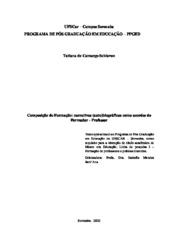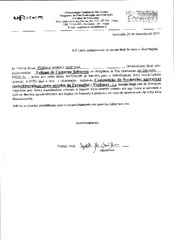| dc.contributor.author | Schiavon, Tatiana de Camargo | |
| dc.date.accessioned | 2020-03-02T17:59:22Z | |
| dc.date.available | 2020-03-02T17:59:22Z | |
| dc.date.issued | 2020-02-03 | |
| dc.identifier.citation | SCHIAVON, Tatiana de Camargo. Composição de formação: narrativas (auto)biográficas como acordes do formador-professor. 2020. Dissertação (Mestrado em Educação) – Universidade Federal de São Carlos, Sorocaba, 2020. Disponível em: https://repositorio.ufscar.br/handle/ufscar/12284. | * |
| dc.identifier.uri | https://repositorio.ufscar.br/handle/ufscar/12284 | |
| dc.description.abstract | The field of formation of the trainer is a recent theme and still little investigated in the educational literature, which justifies the importance of this study. This work is configured as a research-training, because when performing the research one can live in itself the transformations mediated by the reflexive movement lived, as well as the awareness of the performance as teacher trainers, from the dialogy between the act of self-forming and ecoforming, recognizing the conviviality with the group and with the context. We sought, therefore, to answer the question: How do the teacher trainer training processes take place from the perspective of continued training from the dialogy between the act of training teachers and graduating? How does he act? How do you become a trainer? In view of the problem, the objectives aimed to know the profile of the trainers and the reasons that led them to constitute trainers; identify convergences and divergences in the relationship with the constitution of themselves in the lived experience, as well as to know the marks that integrate the process of forming and/or (self-forming), enabled a comprehensive and interpretative analysis of this process. With this, biographical (auto)biographical narratives were used, from the biographical studio device of the project, which underwent some alterations in order to potentiate the reflections. As theoretical and methodological input, Delory-Momberger (2006, 2011, 2012, 2014), Passeggi (2006, 2008, 2011, 2016), Josso (2002, 2007, 2008), among others, was used. The information obtained indicates that the group's formation movement covered cultural, social and political aspects, which mobilized the processes of learning to learn, which points to a need for training through the experiences lived, as well as the finding of a permanent formation in the face of the conjuncture of relationships that are established in intersubjectivity. The use of the biographical studio device of project made it possible to raise awareness of the group, leading participants to think about the constant learning to learn about themselves, which opportunistic one look not only at the path of learning itself, but of the other, in acting as teacher trainers. It results in a recognition that the trainer needs to be attentive to the needs of teachers and the context in which they act, in order to enable moments and spaces of reflection on the trajectories, finding strategies to problematize the various experiences so that they consolidate themselves in meanings, providing the other to experience in themselves processes of resignification that he himself lived.
Keywords: formation of trainers; research-training; methodology (auto)biographical | por |
| dc.description.sponsorship | Não recebi financiamento | por |
| dc.language.iso | por | por |
| dc.publisher | Universidade Federal de São Carlos | por |
| dc.rights | CC0 1.0 Universal | * |
| dc.rights.uri | http://creativecommons.org/publicdomain/zero/1.0/ | * |
| dc.subject | formação de formadores; pesquisa-formação; metodologia (auto)biográfica | por |
| dc.title | Composição de formação: narrativas (auto)biográficas como acordes do formador-professor | por |
| dc.title.alternative | Formation composition: (auto) biographical narratives as trainer-teacher chords | por |
| dc.type | Dissertação | por |
| dc.contributor.advisor1 | Sant'Ana, Izabella Mendes | |
| dc.contributor.advisor1Lattes | lattes.cnpq.br/7860235863062183 | por |
| dc.description.resumo | O campo da formação do formador constitui-se como uma temática recente e ainda pouco investigada na literatura educacional, o que justifica a importância desse estudo. Este trabalho se configura como uma pesquisa-formação, pois ao realizar a pesquisa pode-se viver em si as transformações mediadas pelo movimento reflexivo vivido, bem como a conscientização da atuação como formadores de professores, a partir da dialogia entre o ato de autoformar-se e ecoformar, reconhecendo o convívio com o grupo e com o contexto. Buscou-se, portanto, responder à questão: Como se dão os processos de formação do formador de professores na perspectiva de uma formação continuada a partir da dialogia entre o ato de formar professores e formar-se? Como ele atua? Como se constitui formador? Diante da problemática, os objetivos que visaram conhecer o perfil dos formadores e os motivos que os levaram a se constituírem formadores; identificar convergências e divergências na relação com a constituição de si na experiência vivida, bem como conhecer as marcas que integram o processo de formar e/ou (auto)formar-se, possibilitaram uma análise compreensiva e interpretativa desse processo. Com isso, foram usadas narrativas (auto)biográficas, a partir do dispositivo ateliê biográfico de projeto, o qual sofreu algumas alterações com o intuito de potencializar as reflexões. Como aporte teórico e metodológico utilizou-se Delory-Momberger (2006, 2011, 2012, 2014), Passeggi (2006, 2008, 2011, 2016), Josso (2002, 2007, 2008), dentre outros. As informações obtidas apontam que o movimento de formação do grupo abrangeu aspectos culturais, sociais e políticos, que mobilizaram os processos de aprender a aprender, o que aponta para uma necessidade de formação através das experiências vividas, assim como a constatação de uma formação permanente diante da conjuntura de relações que se estabelecem na intersubjetividade. O uso do dispositivo ateliê biográfico de projeto possibilitou a conscientização do grupo, levando os participantes a pensarem sobre o constante aprender a aprender em si, o que oportunizou um olhar não só para a própria trajetória de aprendizagem, mas do outro, na atuação como formadores de professores. Resulta em um reconhecimento de que o formador precisa estar atento às necessidades dos professores e ao contexto em que atuam, a fim de possibilitar momentos e espaços de reflexão sobre as trajetórias, encontrando estratégias para problematizar as diversas experiências a fim de que se consolidem em sentidos, propiciando ao outro vivenciar em si processos de ressignificação que ele mesmo viveu. | por |
| dc.publisher.initials | UFSCar | por |
| dc.publisher.program | Programa de Pós-Graduação em Educação - PPGEd-So | por |
| dc.subject.cnpq | CIENCIAS HUMANAS::EDUCACAO::ORIENTACAO E ACONSELHAMENTO | por |
| dc.subject.cnpq | CIENCIAS HUMANAS::EDUCACAO::TOPICOS ESPECIFICOS DE EDUCACAO | por |
| dc.publisher.address | Câmpus Sorocaba | por |
| dc.contributor.authorlattes | http://lattes.cnpq.br/9626264926154468 | por |


